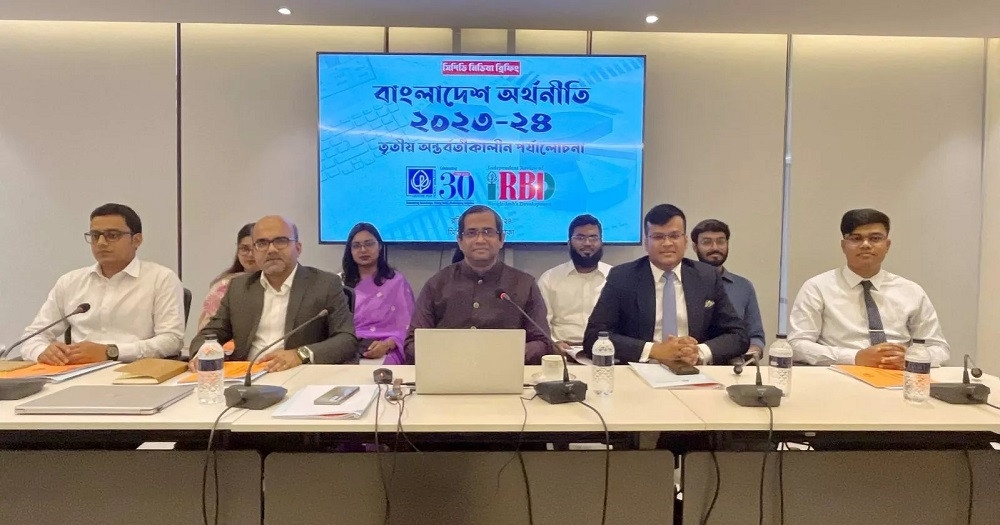Staff Correspondent
Published:2024-06-03 09:27:23 BdST
Essential food is now a luxury for most: CPD
The rising cost of daily essentials have made them unaffordable to the point where they are now luxury for the low income and middle class, said the Centre for Policy Dialogue (CPD) at a briefing on Sunday.
The private think tank also said that food inflation is more volatile which started at 9% in April 2023, peaked at 13% in August 2023, then dipped to 9% in February 2024, but then rose to 10% in April this year.
Golam Moazzem, research director of CPD was speaking at a media briefing titled “State of the Bangladesh Economy in FY24” organized by the CPD in the capital.
At the event, CPD also said that the poor and lower income people were hit hard by the hike in price of rice, as the coarse variant -- consumed mostly by low-income people -- experienced a hike of 30% to Tk52 in May 19 of this year, which was Tk40 in January 1, 2019.
Moreover, the prices of fine variant rice, also known as Miniket, hiked by 17% to Tk68 per kg, from Tk58 and Paijam variant hiked by 15% to Tk55 per kg, said CPD data.
In its earlier reports, CPD showed that the price of three common types of rice in Dhaka has been consistently higher than that of Thai and Vietnamese rice.
The average price lentils such as Masoor dal (big) increased by 95% from Tk55 to Tk108, the average price of Masoor dal (medium) increased by 88% from Tk63 to Tk118, and the average price of Masoor dal (small) increased by 56% from Tk85 to Tk133 from January 1, 2019 to May 19, 2024, said the CPD data.
The average price of loose soybean oil hiked by 84% from Tk81 per litre to Tk150 per litre, and the average price of bottled soybean oil increased by 56% from Tk104 per litre to Tk163 per litre from 1 January 2019 to 19 May 2024.
As of April, the price of soybean oil in the world market was Tk105 per litre, lower than the prevailing price in the Bangladesh market, said the CPD data.
Also during this period, the price of sugar in the European Union market was Tk39 per kg whereas it was Tk96 in the US market and Tk50 per kg in the global market -- all of which were lower than the prevailing price in the Bangladesh market.
The price of sugar increased by 152% from Tk52 per kg to Tk130 per kg from 1 January 2019 to 19 May 2024, said the CPD data.
The government may take initiatives but those are inadequate. The expenditure on food is increasing without keeping pace with the income, he further said.
“The commodity prices in our country do not match our economic status. Though there are some government efforts -- tariff reductions on essential commodities -- it only benefits a particular group of people,” Moazzem stated.
He also said that the disparity between the rich and the poor has increased. The current per capita domestic income is $2,675 where per capita national income is $2,784, mainly because of the high earners.
Considering the poor people, their income has decreased, he added.
Both private and public investment didn’t increase as per the expectations; he went on saying GDP growth was estimated at 7.5% which lowered to 6.5% in January.
“International organizations, including the IMF, have estimated it even lower. The government is far from the budget target. The employment trend is not increasing with the growth of GDP,” he added.
CPD also stated that the government is borrowing at high interest rates in many cases in terms of foreign debt. Short-term borrowing, especially in the power and energy sector, is putting additional pressure on reserves for quick repayments.
Responding to a question, Golam Moazzem said that at the moment there is no option but long-term reform.
He went on adding that a number of persistent issues and challenges are placing a great deal of burden on the Bangladesh economy, which cannot be solved through short term measures.
“The budget's primary goal should be to restore macroeconomic stability. Instead of GDP growth, protecting the interests of vulnerable and disadvantaged groups should be the priority of the policymakers,” he observed.
The think tank stated that in order to provide relief to the people who are struggling with inflation and low income, policymakers must also propose specific measures.
“Therefore, the macroeconomic framework for the upcoming FY25 should continue to focus on curbing inflation and stabilizing the exchange rate,” he commented.
The CPD also said that despite certain beneficial policy initiatives launched by the Bangladesh Bank, the economy of Bangladesh in the first ten months of FY24 shows that the remaining months of the fiscal year will continue to confront persistent issues.
This is due to the fact that any policy's results take time to manifest. But complementing policies in other domains are also necessary for any policy to be effective.
Responding to another question from the media, he said that the reforms the government has brought including new calculation of GDP, crawling peg, adjusting fuel and energy price regularly are all according to reform based on IMF prescriptions.
He also said that there are lapses in legal reforms, monitoring and internal market management to control the inflation, which needs to be reformed.
Unauthorized use or reproduction of The Finance Today content for commercial purposes is strictly prohibited.


